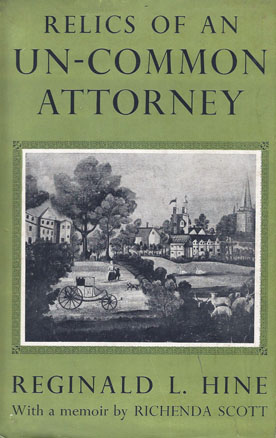
Out of Print
In the title of his now famous Confessions, published in the autumn of 1944, Reginald Hine first described himself as'An Uncommon Attorney.' To-day the thousands of readers who delighted in it would not deny him the designation unique.
The present volume of his work, issued under the joint editorship of Mrs. Reginald Hine and Mildred Bozman, is prefaced by a Memoir of the author by Dr. Richenda Scott, the historian, for many years an intimate friend of the author and his family. The papers in it are a selection from those left finished, but unpublished, at his death last year.
The contents cover a range in keeping with a lawyer who wore his deep learning with the adornments of scintillating wit and warm humanity; with the historian whose passion for exact knowledge and detailed research went with the gift of the 'common touch'; and with a man who rejoiced in the day's work and the day's play.
The collection opens with a remarkable sketch of the daily life and work of an English country squire of the late seventeenth century, divined from an ancient account-book which came into the author's hands; it closes with a study of the life and art of F. L. Griggs, for many years the author's friend.
Between these two pieces is to be found a medley of interests. These include various aspects of that local Hertfordshire history for which Hine is renowned-one being a serious, and at the same time often comic, account of the doings of those predecessors of the Home Guard - the Loyal Volunteers of 1803, who stood to arms when Napoleon threatened our shores. There is a vividly told story, based on fact though dressed as fiction, entitled 'Killing No Murder.'
There are short, pithy essays on such sidelines as the law relating to the use and abuse of footpaths, the law relating to swearing, or (to turn from the Law) Hine's own views on brevityin biography. There is a pen-portrait of a famous Hitchin hostelry which brings the good guidance of old innkeepers, the good company of old inns, and the very savour of centuries of good food and drink to the reader's soul: There is an account of that only partially studied subject-the writings, secular and religious, sacred and (sometimes in each sense of the word) profane. to be found graved on the stones of ancient churches and known as 'Graffiti.'
There is the intriguing story of the discovery and identification of an iron fiddle, made and played by John Bunyan in his less regenerate days, and-to complete but a sample list-a deeply humane 'meditation' amongst the papers of that Hitchin firm of several hundred years' standing of which we read in the Confessions. It is hoped that the index conforms to the standards of fullness and of accuracy that would be demanded by Reginald Hine himself.